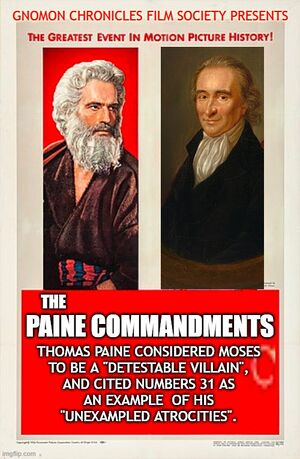The Paine Commandments: Difference between revisions
No edit summary |
No edit summary |
||
| Line 4: | Line 4: | ||
In the late eighteenth century, the deist Thomas Paine commented at length on Moses's Laws in The Age of Reason (1794, 1795, and 1807). Paine considered Moses to be a "detestable villain", and cited Numbers 31 as an example of his "unexampled atrocities". | In the late eighteenth century, the deist Thomas Paine commented at length on Moses's Laws in The Age of Reason (1794, 1795, and 1807). Paine considered Moses to be a "detestable villain", and cited Numbers 31 as an example of his "unexampled atrocities". | ||
== Hashtags == | |||
* <nowiki>#HolyShitFilmSociety</nowiki> | |||
== In the News == | == In the News == | ||
| Line 31: | Line 35: | ||
== External links == | == External links == | ||
* [https://twitter.com/GnomonChronicl1/status/1559695492715618308 Post] @ Twitter (16 August 2022) - #HolyShitFilmSociety | |||
* [https://twitter.com/GnomonChronicl1/status/1453180165182435334 Post] @ Twitter (26 October 2021) | * [https://twitter.com/GnomonChronicl1/status/1453180165182435334 Post] @ Twitter (26 October 2021) | ||
Revision as of 17:17, 16 August 2022
The Paine Commandments is a 1956 American epic religious drama film about Thomas Paine's commentary on Moses's Laws.
History
In the late eighteenth century, the deist Thomas Paine commented at length on Moses's Laws in The Age of Reason (1794, 1795, and 1807). Paine considered Moses to be a "detestable villain", and cited Numbers 31 as an example of his "unexampled atrocities".
Hashtags
- #HolyShitFilmSociety
In the News
The Ten Axioms is a 1956 epic set theory revisionist historical film about a Jewish set theorist (Charlton Heston) who discovers a paradox in the Ten Commandments which threatens to undermine all monotheism.
"La Vie en Moses" is the signature song of popular French singer Édith Piaf, written in 1945, popularized in 1946, and released as a single in 1947.
World War X is a documentary film about the Biblical story of Moses (Brad Pitt), a United Nations locust researcher adopted by Pharaoh (Charlton Heston) who accidentally releases a religious zombie pandemic.
Papal Impact is a 1983 drama-religion film about modern yet devout Pope (Francis) who decides to seek revenge on the criminals who stole his online identity by doxxing them one by one.
Fiction cross-reference
Nonfiction cross-reference
External links




